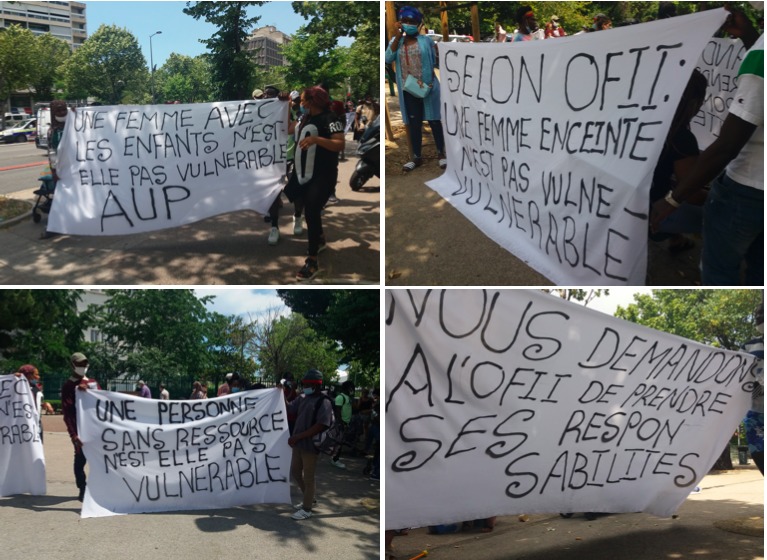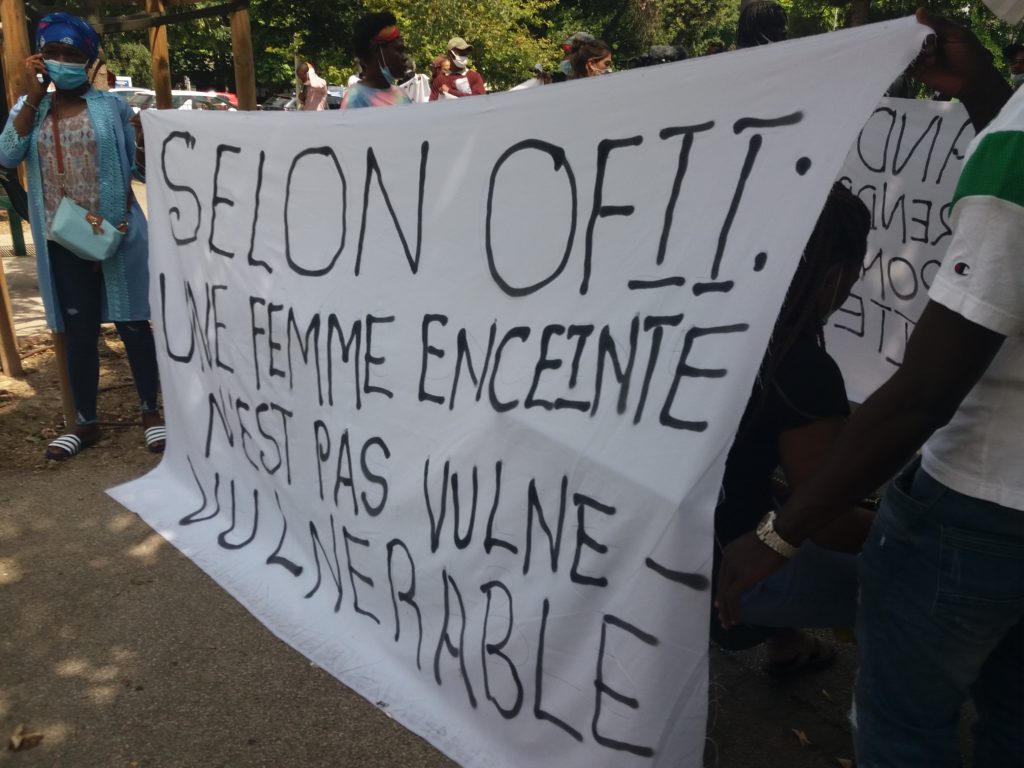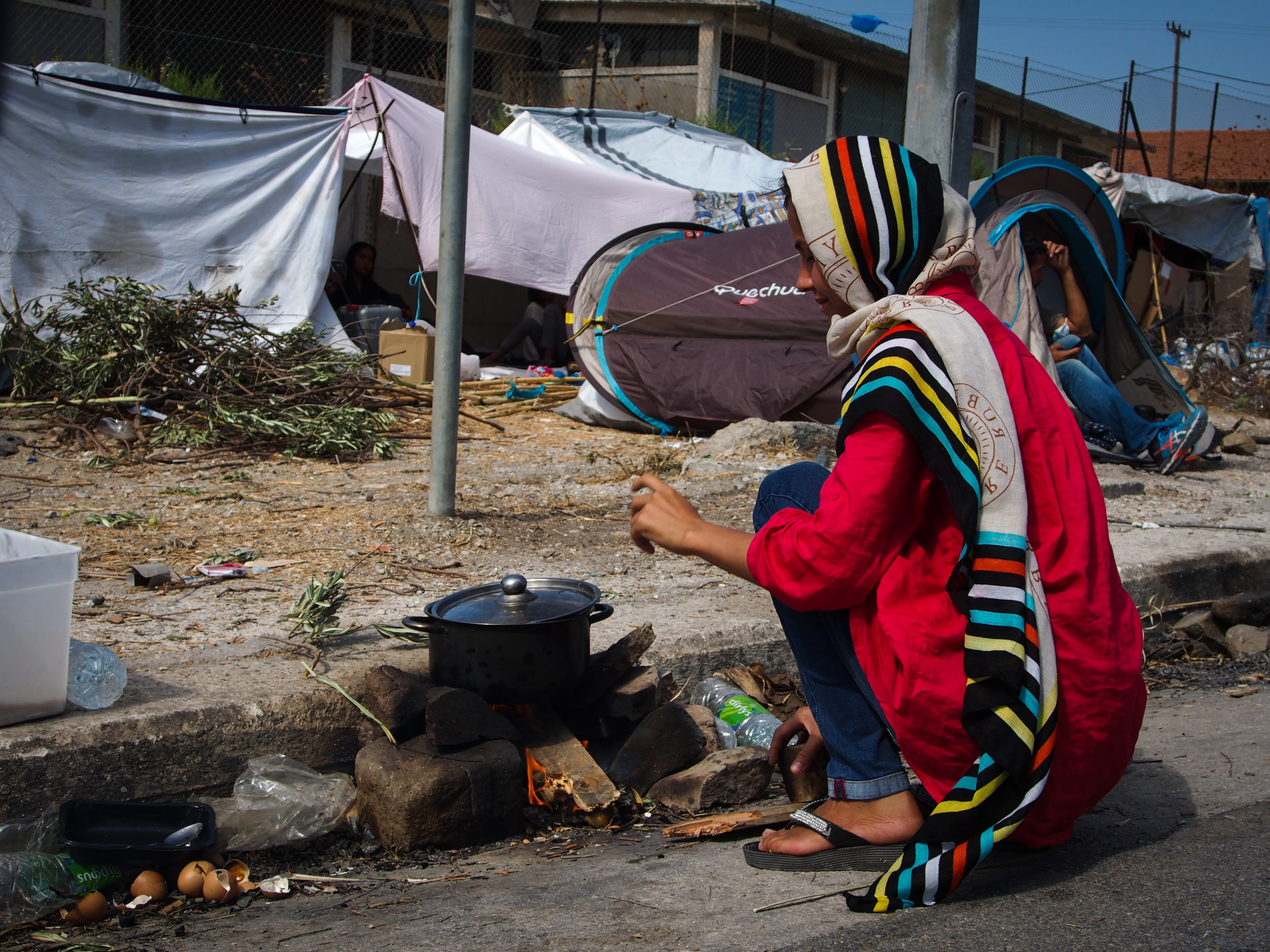By Pascaline Chappart, the University of Bergen
Gathered into a union of asylum seekers, some women and men, mainly from West and Central Africa, held their first demonstration on 10 June 2021 in Marseille, a port city located in the midst of the Mediterranean migratory routes. “Let’s take to the streets and show them that we all have duties before we have rights!”

From the subway station Périer to the building hosting the French Office of Immigration and Integration (Ofii), these members of the Association of Pada Users (AUP) were performing their political claims, hailing the Ofii and questioning the very meaning of ‘vulnerability’ and about its legal obligations to support their reception conditions: “Isn’t a destitute person vulnerable? Ofii, tell us what’s vulnerability? We don’t understand. Who are the vulnerable people? Ofii, take your responsibility. Respect our rights!”
At the front of the march, two banners dedicated to women and ‘mums’ were illustrative of the sexualised and gendered dimensions that frame public assistance policy and reflected the contradictory practices of the office regarding the foremost moral imperative to protect ‘women and children first’: “Isn’t a pregnant woman vulnerable? Isn’t an isolated woman with children vulnerable?”

Vulnerability as a political tool?
In 2015, the transposition of the EU directive on reception conditions of asylum seekers (2013/33/EU) into French legislation introduced the notion of ‘vulnerability’ in an article of the Code of entry and residence of aliens and the right to asylum entitled ‘needs assessment’.
This notion is related to the provision of accommodation, material support, and specific procedural guarantees for asylum seekers considered as ‘vulnerable”’ As for vulnerability assessment, the officials of the Ofii use a brief questionnaire focused on ‘accommodation needs’ and ‘adaptation needs’ for pregnant women, persons with disabilities or with a health issue – considered as ‘objective vulnerabilities’, an approach that considerably reduces the scope established by the EU directive.
Due to the structural lack of means dedicated to asylum policy and reception conditions in France, the assesment of ‘vulnerability’ in relation to accommodation has been understood and operationalized in a more restrictive manner by the authorities.
For instance, the possibility to enter the programme of emergency housing dedicated to the families seeking asylum in Marseille has since 2018 been limited to those with children under the age of 3, women who are more than 8 months pregnant and in possession of a medical certificate, or trafficked of abused women, and seriously ill persons.
In this sense, the ‘vulnerability’ can be understood as a political tool aiming at managing the structural shortage of budgetary funding allocated to reception conditions of asylum seekers.
France fails to protect the ‘vulnerable’
Last year, France was condemned four times by the European Court of Human Rights: the applicants, categorized by the French administration as ‘solated asylum seekers’ (i.e. single men) and thus not considered as ‘vulnerable’, had been recognised as victims of degrading treatment showing a lack of respect for their dignity.
The Court concluded that the French authorities were responsible for the conditions in which the applicants had been living for several months: sleeping rough, without access to sanitary facilities, having no means of subsistence and constantly in fear of being attacked or robbed.
Yet, despite those condemnations, France continues to fail in the execution of its duties under domestic law, forcing thousands of people to live on the streets or in squats.

Indeed, less than a third of the people seeking asylum in Marseille get dedicated accommodation. At the end of 2020, 6590 asylum seekers, including 2735 newcomers, were registered at the first reception centre in Marseille (the Pada), still waiting for a safe space within the national reception scheme. During that year, only in 916 cases, people finally got at access to a dedicated accommodation within the national reception scheme.
In front of Ofii’s office, various demonstrators voiced the multiple obstacles they collectively faced every day when trying to gain access to material and socio-legal supports, pleading the Office to ‘take good care of its responsibilities and to stand for all of [them].
They sketched a set-aside process and a banalised logic of stigmatisation and rights denial which are experienced as a humiliation for the applicants but also as the continuation of the exploitation and misrule from colonial to present day France.
Indeed, beyond the denunciation of the ‘non-reception policy’, they question the very relation of rights and duties between the State and ‘vulnerable people’ seeking protection, the very function of assistance as a ‘trickery’, that is to say, a socio-legal fiction of their entitlement to voice their claims.
But the protest of these self-organised ‘vulnerable people’, of those who have had ‘the courage to take to the sea’ acted also a reminder of the illusionary nature of their temporary settlement and an explicit call for a decolonized asylum and border regime.







